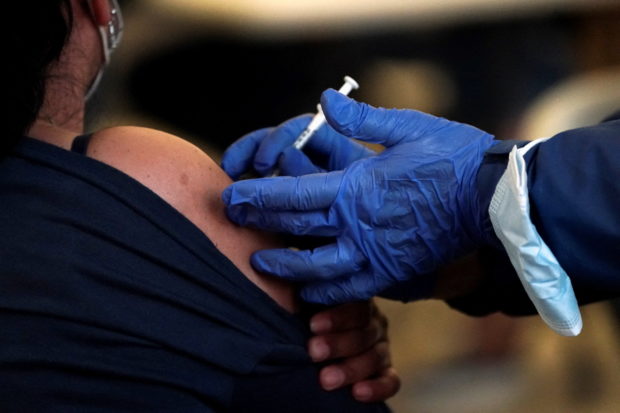DOH’s new guidelines cut COVID isolation, quarantine time for fully vaccinated

FILE PHOTO: A health worker administers a dose of an anti-COVID vaccine to a person on December 22, 2021. REUTERS/Bing Guan
MANILA, Philippines — The Department of Health (DOH) on Wednesday said it has updated its guidelines on quarantine and isolation periods for vaccinated, partially vaccinated, and unvaccinated persons who are infected or a close-contact of a COVID-positive individual.
In a press conference, the DOH said the quarantine period for a vaccinated close-contact of a COVID-19 afflicted person will be shortened from seven days to just five days but it will still be 14 days for a partially vaccinated or unvaccinated person who is exposed to a sick person.
The isolation period for a fully immunized coronavirus-infected individual who exhibits symptoms – even if mild – will be reduced from 10 days to only 7 days, while it will still be 10 days for a partially immunized and unvaccinated individual who contracts COVID-19.
As for an asymptomatic fully vaccinated person, isolation time will be cut to seven days, starting from when they received a positive test result, while it will still be 10 days for an infected partially immunized or unvaccinated person who shows no symptoms.
But the isolation period for moderate COVID-19 cases will remain at 10 days for all individuals regardless of vaccination status.
Meanwhile, COVID-19 patients who are considered as severe and critical cases will still be required to isolate for 21 days regardless of vaccination status.
According to DOH Undersecretary Maria Rosario Vergeire, these changes came about after the National Institute of Infectious Diseases Control and Prevention Center found that based on respiratory samples from the Omicron variant, the viral RNA (Ribonucleic acid) was highest 3-6 days after diagnosis or symptoms onset.
“And samples were then observed to have a marked decrease after 10 days since diagnosis or symptoms onset,” she pointed out.
“Findings also showed that vaccinated asymptomatic and mild cases are unlikely to shed infectious virus 10 days after the diagnosis or symptoms onset,” she added.
The DOH said these updated quarantine and isolation guidelines will take effect starting January 13,
Previously, the health agency announced a modified quarantine and isolation protocol for fully vaccinated health workers – who should undergo a five-day quarantine if fully vaccinated and exposed to coronavirus-hit persons or should not undergo quarantine at all if already inoculated with a booster dose “based on risk and benefit assessment of Hospital’s IPCC (Infection Prevention and Control Committee).”
READ: IATF finds way to avert hospital staff shortage
READ: Group slams move to shorten isolation period for COVID-positive health workers
READ: DOH defends reduced quarantine for COVID-hit fully vaxxed health workers
According to the DOH, quarantine refers to “the period to monitor well-being after being identified as a close contact with a person with COVID-19” while isolation refers to “separating people with symptoms or confirmed COVID-19 cases.”
KGA
For more news about the novel coronavirus click here.
What you need to know about Coronavirus.
For more information on COVID-19, call the DOH Hotline: (02) 86517800 local 1149/1150.
The Inquirer Foundation supports our healthcare frontliners and is still accepting cash donations to be deposited at Banco de Oro (BDO) current account #007960018860 or donate through PayMaya using this link.